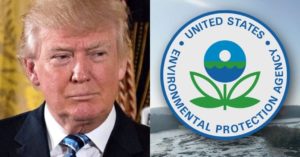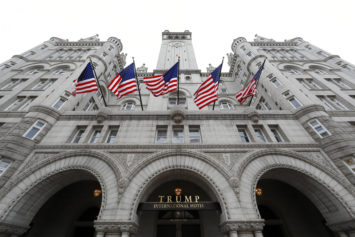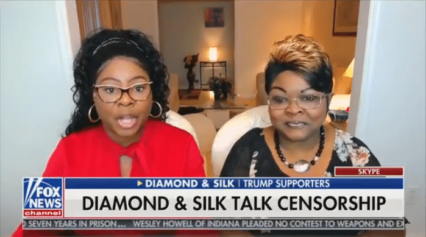In 2015, the Obama administration took its first steps to address global warming, unveiling the Clean Power Act in an effort to curb carbon emissions in existing power plants. Less than two years later, new president Donald Trump, when not jotting off to Mar-a-Lago resort, has started making good on his promise to unravel his predecessor’s legacy, signing new executive orders and appointing Cabinet personal who are decidedly anti-climate change and hell-bent on scrapping Obama-era environmental protections.
Trump himself has a history of doggedly ignoring scientific fact on the issue of climate change. At times, he has even gone as far as to suggest that global warming is a hoax, insisting, “The concept of global warming was created by and for the Chinese.”
Since failing to deliver an immediate repeal of the Affordable Care Act, the White House has been looking for a political win. Touting federal overreach as a justification for rolling back environmental protections, the Trump administration has grown comfortable using the coal industry as an example of his campaign pledge “to revitalize the economy.” But the truth of the matter is that the coal industry is beyond repair. tI’s not coming back. The millions of jobs that Trump promised to the rural areas that overwhelming voted for him also are not coming back.
Under the new executive order, singed recently at the office of the Environmental Protection Agency, officials won’t be required to consider the consequences of climate change when making policy decisions, federal coal leases will be lifted, carbon emission rules relaxed and more. Not only would the U.S. be stripped of current environmental protections, anything else that Trump deems harmful to economic growth could be in jeopardy, a tactic he describes as “I am taking historic steps to lift restrictions on American energy, to reverse government intrusion and to cancel job-killing regulations.”
For Trump, these historic steps also include removing guidelines for vehicle fuel efficiency, erasing power plant emission rules and refusing to invest in measures like solar energy or clean power.
As Mick Mulvaney, White House budget director, explained, “Regarding the question as to climate change, I think the president was fairly straightforward. We’re not spending money on that anymore. We consider that to be a waste of your money.”
And, while it appears that the U.S. won’t withdraw directly from the Paris Climate Agreement — for now at least — it appears unlikely that we’ll be able to uphold its required emission reductions. In an effort to tackle global warming under President Obama, the United States had joined over 175 other countries to set a goal to reduce emission rates; the U.S. tasked with decreasing its own by 26-28 percent in time for the 2025 deadline set in the agreement.
During last year’s Marrakech conference, Alden Meyer, director of strategy and policy for the Union of Concerned Scientists, had warned, “If President Trump were not to honor the U.S. commitments under the Paris agreement, it will negatively impact his ability to get the cooperation of world leaders on other issues he cares about, such as trade and terrorism.” Trump has ignored such warnings and instead has decided to move full-speed ahead with his stated program of pro-business growth over slowing down climate change.
Environmental Protection Administration leader — and former adversary of the agency — Scott Pruitt will largely be in charge of navigating complicated environmental laws and the political fight still to come. But, even with an executive order, existing legislation can’t be undone overnight.
Speaking with The New York Times, NYU environmental law professor Richard L. Revesz explained that, “The executive order has no legal significance at all. It’s like the president calling Scott Pruitt and telling him to start legal proceedings. It does the same thing as a phone call or a tweet. It just signals that the president wants it to happen.”
The White House also received criticism from an unlikely source after the EPA accidentally sent out a press release that included a not-so-glowing review of the the president’s order. Incorrectly attributed to Sen. Shelley Moore Capito, the quote actually came from a statement released by Delaware Sen. Thomas R. Carper that read “With this Executive Order, President Trump has chosen to recklessly bury his head in the sand. Today’s executive order calls into question America’s credibility and our commitment to tackling the greatest environmental challenge of our lifetime.”
He continued, “With the world watching, President Trump and Administrator Pruitt have chosen to shirk our responsibility, disregard clear science and undo the significant progress our country has made to ensure we leave a better, more sustainable planet for generations to come.”
Others opponents have also chimed in, including California Gov. Jerry Brown, who indicated that he would be open to taking the Trump administration to court. According to Brown, “Gutting the Clean Power Plan is a colossal mistake and defies science itself. Erasing climate change may take place in Donald Trump’s mind, but nowhere else.”
Added Heather Zichal, former Obama-era deputy assistant for energy and climate change, “President Trump’s executive order to roll back vital climate and clean air protections this afternoon is the most brazen and transparent assault on the health of Americans in my lifetime.”
Whether he believes his own rhetoric or not, Trump’s agenda isn’t sitting well with the scientific community. In an email statement recently released by Ken Kimmell, president of the Union of Concerned Scientists, he said, “The wrecking ball that is the Trump presidency continues. The executive order undercuts a key part of the nation’s response to climate change, without offering even a hint of what will replace it.”


